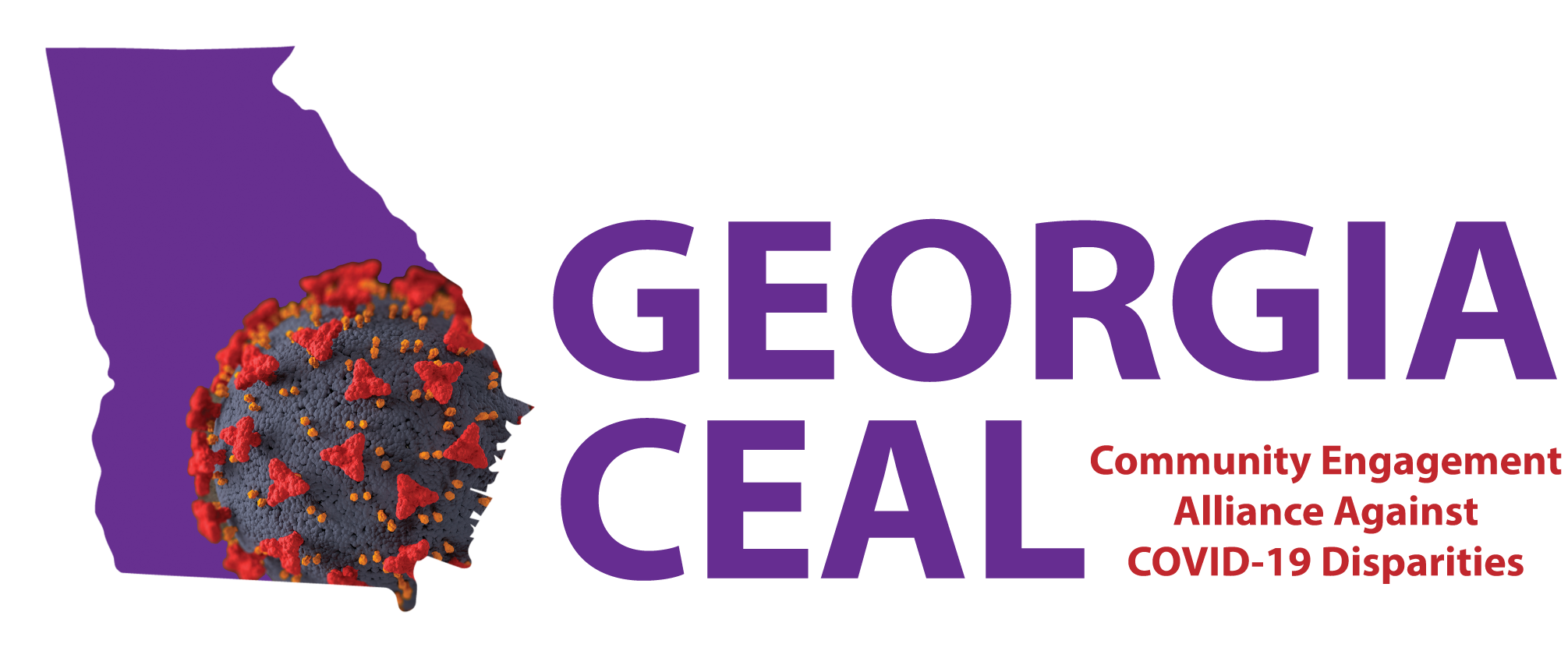About Us
Georgia CEAL
Garnering Effective Outreach and Research in Georgia for Impact Alliance (Georgia) Community Engagement Alliance (CEAL) Against COVID-19 Disparities
Morehouse School of Medicine and statewide partners received support from the National Institutes of Health for community-centered COVID-19 pandemic outreach, research, engagement and vaccination uptake efforts in ethnic and racial minority communities to form GEORGIA CEAL. It is a statewide coalition that is part of a network of 21 support teams across the US. Each statewide effort through the CEAL Network collaboratively conducts urgent community-engaged research and outreach focused on COVID-19 awareness and education to:
The Georgia CEAL team lead principal investigators are Tabia Henry Akintobi, PhD, MPH, working with other community and campus principal investigators: Sedessie Spivey, Ed (Dekalb County Board of Health), David Williams, MD, MPH (Southside Medical Center) and Robert Bednarczyk, PhD, MPH (Emory University). Their collaborative teams are guided by a Community Coalition Board designed to ensure that research and outreach processes and findings are translated with, co-created by, and relevant to communities.
Georgia CEAL and the twenty CEAL research teams leverage established relationships between NIH-funded researchers and local community-engaged leaders to help reach underserved communities that might not be located near COVID-19 clinical research or vaccination recruitment sites.
Purpose
The COVID-19 pandemic has revealed striking morbidity and mortality disparities among racial and ethnic minority communities, and populations who are disproportionately exposed infected and die due to complications associated with COVID-19. This has underscored the urgency for multipronged, and community-engaged strategies to reduce these inequities. Disparities are amplified by community mistrust and misinformation and policy-influenced mitigation behaviors.
Georgia CEAL works to eliminate these disparities across Georgia. Georgia CEAL delivers intentional and strategic engagement of Black and LatinX communities with social and medical vulnerabilities related to the pandemic. This is achieved through community co-creation of culturally sensitive outreach, health communication, and science, from those who are trustworthy and are at the core of changing the path towards reduced hospitalization, illness, and death from related to COVID-19.

Georgia CEAL Community Coalition Board

The COVID-19 pandemic has revealed striking morbidity and mortality disparities among racial and ethnic minority communities, and populations who are disproportionately exposed infected and die due to complications associated with COVID-19. This has underscored the urgency for multipronged, and community-engaged strategies to reduce these inequities. Disparities are amplified by community mistrust and misinformation and policy-influenced mitigation behaviors.
Georgia CEAL works to eliminate these disparities across Georgia. Georgia CEAL delivers intentional and strategic engagement of Black and LatinX communities with social and medical vulnerabilities related to the pandemic. This is achieved through community co-creation of culturally sensitive outreach, health communication, and science, from those who are trustworthy and are at the core of changing the path towards reduced hospitalization, illness, and death from related to COVID-19.
Strategy

Georgia CEAL leverages and capitalizes upon existing community partners, leaders, and knowledge holders, community resources, and local service delivery settings to enhance education, awareness, access, and inclusion of underserved communities in research and outreach. This research and outreach are designed to advance the prevention and treatment of COVID-19, reduce disease disparities statewide, including hard-to-reach individuals; and establish Georgia CEAL as a statewide community engagement hub for COVID-19 mitigation and future public health emergencies.
Georgia CEAL is designed to conduct community-responsive, innovative research and outreach to understand and address vaccine hesitancy, misinformation, and mistrust towards acceptance, confidence in, and uptake of COVID-19 vaccination.



